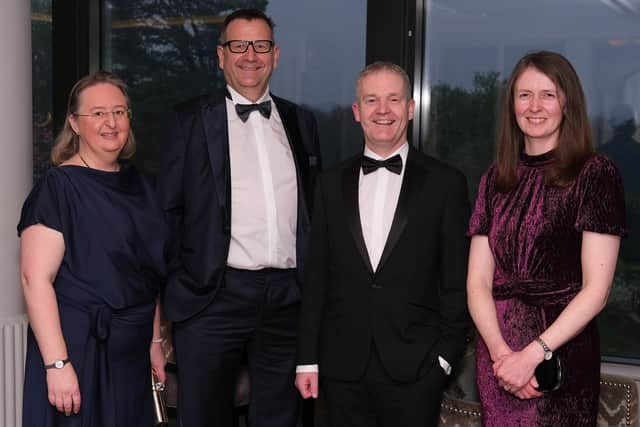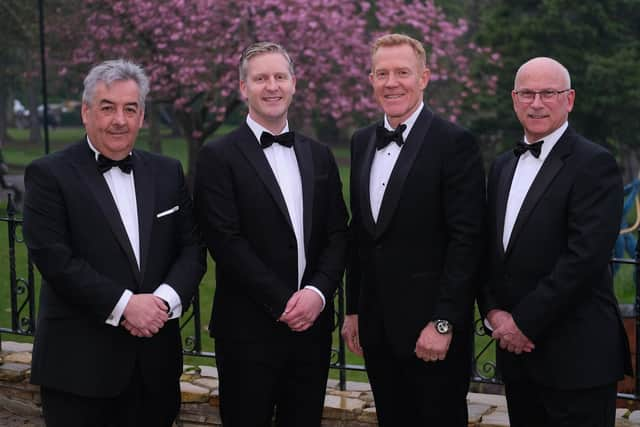Feed compounding sector continues to respond to the challenges facing local agriculture


“But as always, we have stepped up and faced these challenges head-on.”
McIntyre reflected on these matters courtesy of his presentation to NIGTA’s 2024 annual dinner.
Advertisement
Advertisement
McIntyre continued: “We continue to see issues on the supply of grains and raw materials to our market. While the current fundamental outlook for supply looks adequate, we live in a world with the highest geo-political tensions seen in a long time.


“We see a European Commission proposal to implement a 95 EUR/T duty on grains and a 50% tariff on oilseeds and products imported from Russia and Belarus.
“Persistent wet weather in Europe continues to hamper spring plantings and is impacting crop development.”
The impact of the atrocious weather on agriculture over the past year was a theme that was reflected throughout the NIGTA president’s speech.
Advertisement
Advertisement
He said: “Twenty-nine days of rainfall in March were recorded in some areas of Ireland and so far, April has continued that trend.


“A further challenge for our industry is to navigate the proposed EU Deforestation Regulation, referred to as EUDR, due to commence on 30th December this year.
“Outside pressure on EU is mounting to delay as most countries and suppliers are not prepared. However, the official EU stance is still as it was.
“EUDR is to be rolled out as planned and yet we are still no clearer about NI Divergence between EUDR and UKDR
Advertisement
Advertisement
“Every sector within our industry has faced its own unique challenges, but despite the
difficult trading conditions, once again you have shown incredible flexibility, agility, and resilience.”
McIntyre continued: “The sustainability agenda remains a key priority for NIGTA, with mounting pressure coming from both policymakers and the marketplace.
“We are acutely aware of the challenges related to air, soil and water quality, and the risk that environmental targets could become our agri-food industry’s licence to operate.
Advertisement
Advertisement
“But we are also focused on the opportunities available within the animal feed and fertiliser sectors to help support our farming customers in reducing their environmental footprint to enhance the green credentials of Northern Ireland agri-food.”
According to McIntyre, NIGTA has been proactive in driving forward better nutrient use efficiency, and developing precision nutrition and feeding strategies, by delivering professional advice at farm level, provided by the FAR accredited feed advisers.
“Nevertheless, widespread industry collaboration will be needed to help deliver the
ambitious emission reductions required,” he further explained.
Advertisement
Advertisement
“Fortunately, within Northern Ireland, we have an excellent track record of the agri-food
industry working together for the common good.
“By our NIGTA members working together, we are stronger and better equipped to tackle whatever comes our way, and by joining forces with others from across the industry we can ensure that our voice is heard, and that politicians and decision makers recognise the true value of what we have to offer.
“Within NIGTA we have some extremely talented and capable people who are experts in their field, they continue to work tirelessly for the good of everyone.
“This is time consuming work and the dedication of the executive team and the sub committees are to be commended.
Advertisement
Advertisement
“This work requires our membership to actively support this work, but the ask from various bodies is often more than talent and time, we are asked to fund many research projects with the aim of building and protecting our industry, as stakeholders of the association we commit to supporting the right projects in a proportionate manner.
The NIGTA president specifically referenced the important played by farming and food within Northern Ireland’s entire economy.
“As feed businesses and suppliers, we are very aware of the importance of agri-food to the economy of Northern Ireland: as an employer and a major export earner,” he confirmed.
“Over three-quarters of our meat, milk and eggs is consumed beyond these shores.
Advertisement
Advertisement
“Ongoing research into the requirements and ration formulation for different types of livestock and development of feed additives such as ammonia grabbers or mycotoxin binders are key to delivering a successful, sustainable and profitable future for the livestock sector.
“Precision nutrition is the mantra as we seek to improve food conversion and reduce emissions to air and water.”
McIntyre confirmed the threat from mycotoxins in feed as being ever-present and becoming more complex with the awareness of new and emerging variants with potential to impact on livestock performance and increased emissions.
He concluded: “The Food Fortress program for monitoring and managing contaminants in feed is an essential element in meeting these challenges, it continues to grow and add value all along the food chain.
Advertisement
Advertisement
“The partnership with Queen’s University Belfast is key to this success. Scientists there are global leaders in the field of feed and food safety and authenticity.
“We are currently working with Queen’s on an innovative new project based on the use of artificial intelligence to analyse the ten years of Food Fortress results to identify trends and predict future challenges.”